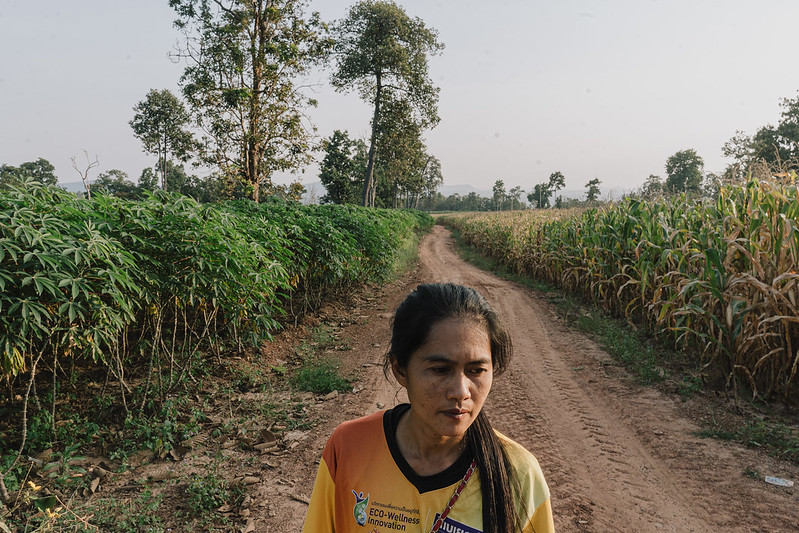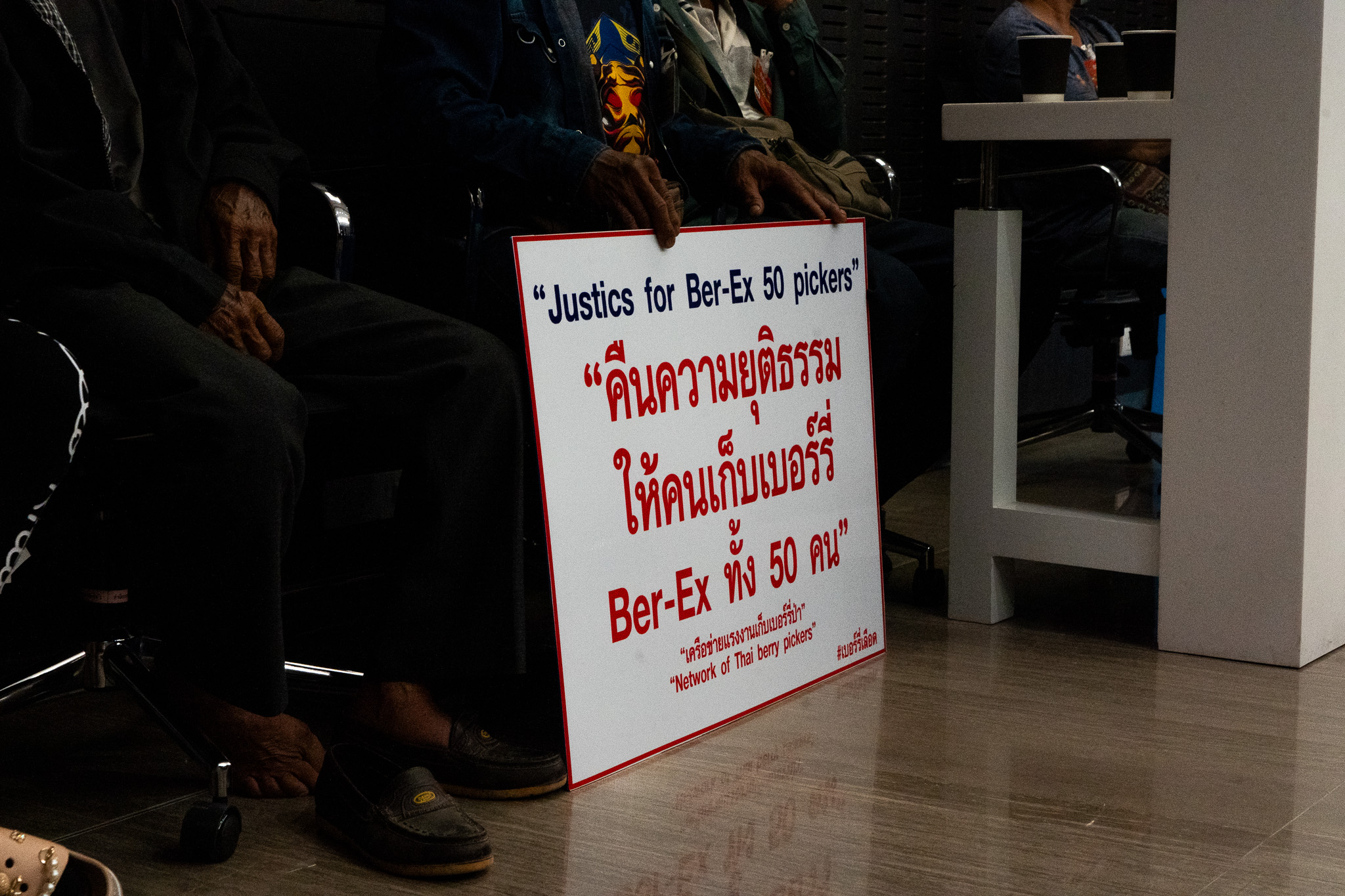The Isaan Record presents a four-part story about the trials and tribulations that one particular couple from Isaan faced picking berries in Finland. With the family deeply in debt, the couple is assured by local government agencies and the Ministry of Labor that picking berries can be profitable and help families with few resources to make a tidy sum of money working just a few months. What they found in Finland were poor living and work conditions, poor pay, and little or nothing to bring back home from their labors. We follow the story of Jenpreeya Jampeehom and her husband of Nong Bua Lampu as they navigate their way through a bitter experience with the sweet berries.
Upon returning to Thailand after months of work as a Thai traditional masseuse in South Korea, Jenpreeya Jampeehom was looking forward to starting a new chapter in her life. She’s earned it.
For nearly two decades, her family had been struggling to pay off the mountain of debt created by her father who had been lured time after time by false promises to secure work abroad.
Jenpreeya’s family’s fortunes had never risen. The income from those high-pay jobs in a foreign lands never materialized: they only resulted in a mounting debt.
In 2004, her father had hoped to go to Israel to improve the family’s financial situation. He took out a loan of 350,000 baht ($9,782) that paid for the travel expenses. However, his name was not included in the list of those eligible to travel. The debt was a particularly heavy one for the period.
To salvage the situation, her father tried again to go abroad. This time, he took out a loan to travel to Libya where he had been told the wage was as high as 30,000 baht per month ($838). With that wage, he could pay off his loan in a year and then another would give him a nice sum to bring back home.
Upon arriving in Libya, though, it turned out he’d receive only a disappointing 13,000 baht ($370) per month. Still, he was able to send 8,000 baht ($227) back home a month. At that rate, it would take him almost four years just to pay off the principal of his earlier debt.
But fate played a cruel joke on him. Just three months into his new work, a war broke out in Libya. He fled back home while still wondering which was worse: a war or debt.
His attempts to improve the family’s situation had backfired. They had taken new loans to pay off old debts, and the interest compounded the debt so much the family was at wit’s end about what to do. Wages in Thailand within reach of the family would never make any dent on the debt .
It was Jenpreeya who would inherit the debt of her hapless father.
Jenpreeya, a teacher at a private school with a 7,000-baht monthly salary ($196), quit her job in 2015. She flew to South Korea with a few thousand baht in her pocket, telling her child and her husband to wait at home. She hoped to earn enough to pay off all the debts of her family.
Six months later Jenpreeya was in the southern city of Busan working as a Thai masseuse and earning a handsome 1,000,000 won ($757) a month. Along with tips from customers, she says, she was able to send home about 34,000 baht every month, more than enough to relieve the financial burden the family was facing.
“It was so much better. I was able to pay off most of the debts,” she says. “I sent back home almost all the money I earned. I kept just 9,000 won (240 baht/$6.80) for myself every month because my employer provided rice, water, eggs, instant noodles, and other food for us to eat. If there were a lot of clients, they would take us out to a KFC [or] a pizza place. They took good care of us.”
“But then I got deported and that was it: just six months.”
On April 1, 2016, Jenpreeya was sent back to Thailand. She had overstayed her visa and worked illegally in South Korea during many of those six months, becoming what is known in Thai as “a little ghost.”
The hope of berrypicking in a pandemic-depressed Isaan
In a mediocre shophouse in a rural northeastern town of Na Klang, Nong Bua Lamphu province, was located a small traditional massage shop owned by Jenpreeya. She had taught herself how to massage with YouTube videos and earned more experience during her short stay in South Korea. After she returned to Thailand, she also took classes and decided to open up her own shop in 2018.
However, the global COVID-19 pandemic that started spreading in late 2019 became a tsunami and Jenpreeya’s tiny sand castle that she had spent so much time and heart to build was swept away in a heartbeat.
She used to earn 1,000 baht a day ($28), but the pandemic restrictions forced her shop to shut down. Still, she had to pay for the rent, food, and loan installments on her car, not to speak of providing for her child and elderly parents, both of whom suffered with chronic conditions. She was spending more than she could earn, and the salary of her husband wasn’t enough to cover all the expenses.
Within three months after having to close her shop, things went from bad to worse to critical: Jenpreeya found herself pregnant with another child. It didn’t take much math to figure out that COVID-19 was dragging the family down to the same depth of their financial burden.
Then, a post on Facebook popped up on Jenpreeya’s feed, maybe a sign that there might just be a light at the end of the tunnel.

“I saw on Facebook pages showing the lives of people picking berries,” she says. “They talked about what it was like. I thought, ‘That wouldn’t be so bad.’ I talked with my husband and we agreed to go together. But we didn’t have any savings, so we wondered what we should do. I went to my aunt [or in Thai may be an uncle] who had some money, telling her that I wanted to go to Finland to pick berries, and she said, ‘Go ahead.’”
But Jenpreeya got mixed blessings from her parents.
“When I told my dad about it, he didn’t want me to go,” she says. “He said life abroad was difficult. Picking berries was like picking mushrooms at home. We get only as many as we can pick, because they grow in a forest, not in a farm. He was not supportive at all, because he had experienced a hard life before.”
Her mother was equivocal. Jenpreeya says, “My mom didn’t say much. She just said for me to do as I wished.”
A labor shortage in Finland opens the door to needy workers from elsewhere
Winai Luwiroj, a former permanent secretary of the Ministry of Labor, says July is the beginning of summer in Europe. When the snow starts to melt, plenty of wild berries grow in the north of Scandinavia and the Subarctic region. Local people pick wild berries, freeze them, and make jam. There is also a demand for berries in industrial production of supplements, vitamins and cosmetics.
People started to grow berries in farms, but the taste of farm berries cannot compete with those from the wild, he says. Therefore, there is still a demand for wild berries, and consequently it has led to the import of laborers to pick them.
In the beginning, Thai people traveled there through connections, whether family or friends, of Thai women who had a Finnish husband. They only needed to pay for flight tickets and personal expenses to be able to pick berries. When it was learned more widely that berry picking could be so lucrative for Thais, comparatively, agency businesses grew to recruit laborers from Thailand. The agencies arrange for accommodation, food, rental cars, and even a high-interest loan for those who need quick cash before traveling.
The business of berries expanded to the point that berry processing and export companies also joined the race to secure labor. They rented old buildings, schools, or resorts as accommodation for workers and provided car rental services. However, they still need Thai agents to headhunt for them.
Jenpreeya and her husband were traveling from a camp to find berry bushes.
Jenpreeya and her husband go into debt on a promise
In early 2022, after her youngest child turned eight months old, Jenpreeya decided it was time. Picking berries in Finland could relieve the family’s financial crisis. So she started contacting agents who arrange for workers to go to Finland.
She borrowed money from her aunt to pay for the agent fee: 20,000 baht ($559) each for herself and her husband. The agency prepared documents, applied for visas, found accommodation, and arranged roundtrip tickets for them.
But that was only the beginning. Jenpreeya learned that an additional 45,000 baht ($1,258) would be deducted from the earnings of each worker to the expenses that the agents paid for them in advance.
So she and her husband each became 65,000 ($1,817) indebted to both her aunt and the company, even before they started any work. Jenpreeya however was still confident that she could earn tens of thousands of baht in profit from berry picking, based on the stories she’d heard on YouTube and Facebook. Government officials also assured them that it would be worth it.
“I had such high hopes then,” says Jenpreeya, “that after working for only three months, both of us would get 300,000 baht ($8,387) to bring home, or at the worst, 200,000 baht ($5,590).”
Would their bet bear fruit?
Look forward to Part II of this story on December 14, 2023
Note: This work is supported by the AspirE project of the European Union (EU)





